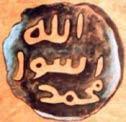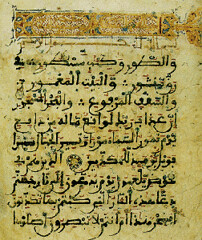In a while, the real post, but first: a huge
alhamdulillaah for shared blessings..while R-R and I were looking up stuff, writing notes and translating bits of Arabic books to English while working on our project, I thought about the enormous blessing that shared faith is..how many people have been tried by their families ..ostracised, discouraged, ridiculed for becoming Muslim (or trying to be a better one)
I thought of Abu Hurayrah..
Abu Hurayrah stayed in Tihamah for several years and it was only at the beginning of the seventh year of the Hijrah that he arrived in Madinah with others of his tribe. The Prophet had gone on a campaign to Khaybar.
Being destitute, Abu Hurayrah took up his place in the Masjid with other of the Ahl as-Suffah. He was single, without wife or child. With him however was his mother who was still a mushrik. He longed and prayed, for her to become a Muslim but she adamantly refused. One day, he invited her to have faith in God alone and follow His Prophet but she uttered some words about the Prophet which saddened him greatly.
With tears in his eyes, he went to the noble Prophet who said to him: "What makes you cry, O Abu Hurayrah?" "I have not let up in inviting my mother to Islam but she has always rebuffed me. Today, I invited her again and I heard words from her which I do not like. Do make supplication to God Almighty to make the heart of Abu Hurayrah's mother incline to Islam."
The Prophet responded to Abu Hurayrah's request and prayed for his mother. Abu Hurayrah said: "I went home and found the door closed. I heard the splashing of water and when I tried to enter my mother said: "Stay where you are, O Abu Hurayrah." And after putting on her clothes, she said, "Enter!" I entered and she said: "I testify that there is no god but Allah and I testify that Muhammad is His Servant and His Messenger."
"I returned to the Prophet, peace be on him, weeping with joy just as an hour before I had gone weeping from sadness and said: "I have good news, O Messenger of Allah. God has responded to your prayer and guided the mother of Abu Hurayrah to Islam.
I thought of Mus'aab bin Umayr whose mother swore "by the stars" that she would never accept Islaam and had him chained in a corner of the house to prevent him from pursuing his faith...
I thought of the Qur'aysh who prevented newcomers to Makkah from hearing the Prophet's sall Allaahu 'alayhi wassallam message and charged him with practising "a magical eloquence" that could turn a man against his family and his tribe within a few minutes..
I thought of Nooh 'alayhi salaam desperately trying to convince his son to get onto the ark when the skies and earth opened forth their waters:
"O my son! embark with us, and be not with the unbelievers!"
The son replied: "I will betake myself to some mountain: It will save me from the water."
Noah said: "This day nothing can save from the Command of Allaah, any but those upon whom He has mercy!"
And the waves came between them, and the son was among those who were drowned
Then the word went forth: O earth swallow up your water and O sky withhold (your rain)..and the water abated and the matter was ended, The Ark rested on Mount Judi and the Word went forth: Away with those who do wrong!"
And Noah called upon his Lord and said: O my LOrd, surely my son is of my family, and Your Promise is true, and you are the Most Just of Judges..
He said: O Noah! he is not of your family for his conduct is unrighteous, so ask not Me of that which you have no knowledge..I give you counsel lest you become of the ignorants!"
11: 42-47
I thought of the countless reverts who are literally left out in the rain ..left vulnerable and lonely without any ties just because they had a change of heart and faith..
subhaanallah, I know of reverts who said their families would have not only accepted them, but would've even supported them if they'd had a change of sexual orientation or had taken a life-changing career decision...but not this, never this...
May Allaah make our children and families the coolness of our eyes, not a source of conflict in our deeyn...may Allaah never try us with that which we cannot bear..and may He ease the suffering of all those in trials of their faith.
Aameen.
Labels: inspirations











![36_2_25[1]](http://static.flickr.com/53/152362417_eb6e804f5b_o.gif)